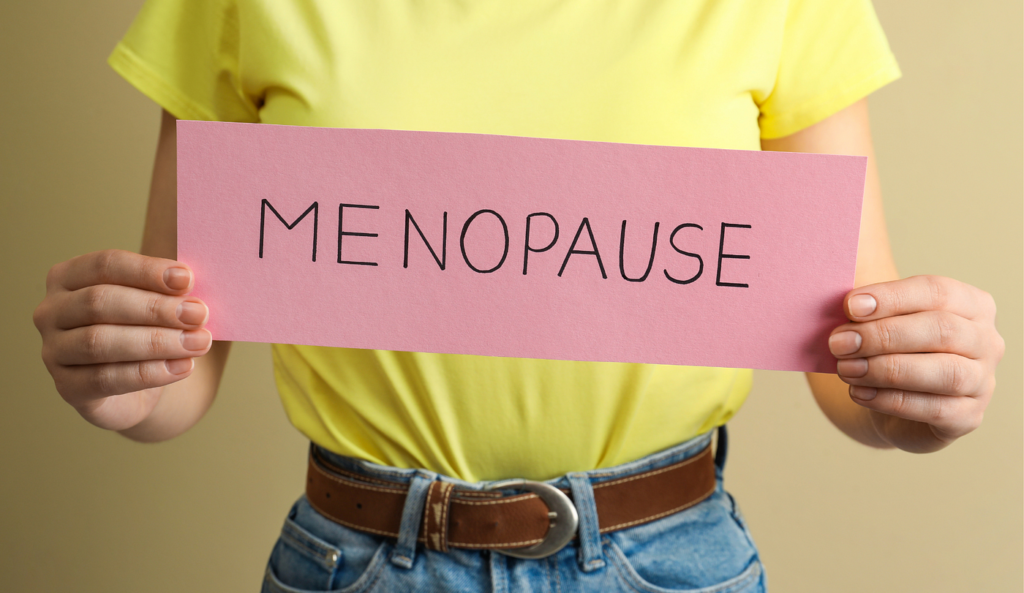Menopause, an inevitable phase in a woman’s life, marks the cessation of menstruation and brings about a myriad of physical, emotional, and hormonal changes. While this natural transition is often associated with discussions around hot flashes, mood swings, and other physiological alterations, one aspect that tends to be shrouded in misconceptions and silence is its impact on female sexual pleasure.
The journey through menopause isn’t merely a biological shift; it’s a pivotal period that can redefine a woman’s relationship with her body, her sexuality, and her sense of self. Despite the prevalent myths and societal taboos, it’s crucial to shed light on the reality that menopause doesn’t signify the end of sexual fulfillment or the ability to experience orgasm.
This conversation extends beyond mere physical changes; it’s about acknowledging and honoring a woman’s right to sexual satisfaction and pleasure at every stage of her life. It’s about dispelling the myths that confine women to stereotypes, suggesting that their sexual vitality dwindles after menopause.
In a world where discussions around female sexual health are often muted or oversimplified, it’s time to open the dialogue, provide education, and create a space where women feel empowered to explore and prioritize their sexual well-being, irrespective of their age or menopausal status.
Recommended: Does Ovulation Make You Emotional?
This article aims to navigate the intricacies of female sexuality post-menopause. By delving into the physiological, psychological, and emotional facets, we aspire to unravel the truths, debunk the misconceptions, and offer guidance for women seeking to embrace and celebrate their sexual pleasure during this transformative phase of life.
Understanding Menopause and its Effects on Female Sexual Health
Menopause isn’t a singular event but a process that unfolds over several stages. Perimenopause, the transitional phase leading up to menopause, typically begins in a woman’s 40s but can start earlier or later for some. During this phase, hormone levels, especially estrogen and progesterone, start fluctuating, leading to irregular periods and various symptoms like hot flashes, mood swings, and changes in libido.
Recommended: Can You Be a Surrogate With Your Tubes Removed?
Eventually, women reach menopause, which is officially diagnosed after 12 consecutive months without a menstrual period. Postmenopause follows, marking the phase after menopause has occurred.

Hormonal Changes and their Impact on Sexual Function
The hormonal fluctuations during perimenopause and the reduced production of estrogen and progesterone post-menopause play a significant role in impacting sexual health. Estrogen, in particular, is crucial for maintaining vaginal health, including lubrication and tissue elasticity. Its decline can lead to vaginal dryness, decreased sensitivity, and potential discomfort during intercourse.
Recommended: Does Sex Affect Periods?
Additionally, changes in hormone levels can affect mood, energy levels, and overall well-being, indirectly influencing sexual desire and arousal.
Common Sexual Health Challenges during and after Menopause
Several common sexual health challenges arise during and after menopause. These include:
- Vaginal Dryness: Reduced estrogen levels can lead to vaginal dryness, causing discomfort or pain during intercourse.
- Decreased Libido: Fluctuating hormones, coupled with physical changes, may impact sexual desire for some women.
- Difficulty Achieving Orgasm: Changes in genital sensitivity and arousal response might make it more challenging for some women to reach orgasm.
Understanding these challenges is vital in addressing the multifaceted aspects of female sexual health during and after menopause. It’s essential to recognize that while these changes are common, they are not universal, and women experience menopause uniquely.
Recommended: How To Get Rid Of Smelly Discharge During Pregnancy
By acknowledging these physiological shifts and their effects on sexual health, we can better explore strategies and interventions to support women in enhancing their sexual well-being post-menopause.

Can a Woman Have an Orgasm After Menopause?
Yes! Menopause is a natural biological process that marks the end of a woman’s menstrual cycles. While menopause can bring about hormonal changes that might affect sexual health, including reduced estrogen levels and changes in vaginal lubrication, many women continue to have fulfilling sexual experiences and orgasms after menopause.
Factors like physical health, emotional well-being, and the quality of the relationship can influence a woman’s ability to experience orgasms after menopause. Communication with a healthcare provider and exploring different techniques or treatments can also help address any challenges related to sexual health during this phase of life. There are various options available, including lubricants, hormone therapies, or other methods to enhance sexual pleasure and function.
Recommended: 10 Best Vitamins For Hormonal Acne
Physical Changes and their Impact on Orgasm
Changes in Genital Sensitivity and Lubrication
- Vaginal Dryness: Reduced estrogen levels during and after menopause can lead to vaginal dryness. This lack of natural lubrication might cause discomfort or pain during sexual activity, affecting arousal and potentially hindering the ability to reach orgasm.
- Genital Sensitivity: Hormonal changes can impact genital sensitivity, affecting the body’s response to sexual stimulation. Decreased sensitivity might require more time, different types of stimulation, or increased focus on arousal to reach orgasm.
The Role of Hormone Replacement Therapy (HRT) and Treatments
- Hormone Replacement Therapy (HRT): For some women experiencing bothersome symptoms like vaginal dryness or discomfort during intercourse, HRT might be an option. Estrogen-based therapies can help restore vaginal health, potentially improving lubrication and comfort during sexual activity.
- Non-Hormonal Treatments: Apart from HRT, various non-hormonal treatments like lubricants, moisturizers, and specific medications or therapies designed to address vaginal dryness can aid in improving sexual comfort and potentially enhancing the ability to achieve orgasm.
Aging and Sexual Response
Aging itself can affect sexual response. Changes in muscle tone and blood flow might alter the body’s sexual response cycle, potentially influencing the time taken to reach orgasm or the intensity of orgasms.
Understanding these physical changes and adapting to them through exploration, patience, and communication with a partner can be instrumental in navigating the journey to orgasm post-menopause.
Recommended: Knee To Chest Position In Labor: All You Need To Know
Recognizing and addressing these physical changes is essential in developing strategies to enhance sexual pleasure and achieve orgasm after menopause. By exploring various treatments, adapting to changes, and maintaining open communication, women can navigate these shifts and work towards experiencing fulfilling sexual satisfaction during this phase of life.

Psychological and Emotional Factors
Influence of Psychological Factors on Sexual Pleasure
- Self-esteem and Body Image: Women may experience changes in their bodies during menopause, which can impact their self-esteem and body image. Feeling less confident or desirable may affect their willingness to engage in sexual activities, potentially impacting pleasure.
- Mood and Stress: Psychological factors like stress, anxiety, or mood disorders can affect libido and sexual response. Managing stress levels and addressing mental health concerns are vital in fostering a positive sexual experience.
Recommended: Does Family Planning Affect Future Pregnancy?
Addressing Self-esteem, Body Image, and Confidence
- Self-Acceptance and Exploration: Encouraging self-acceptance and embracing changes that come with age can positively influence self-esteem. Engaging in self-exploration, self-care practices, and activities that promote self-confidence can contribute to a more positive sexual experience.
- Communication and Intimacy: Open communication with a partner about desires, concerns, and emotional intimacy can strengthen the emotional bond. Building emotional connections fosters an environment of trust and understanding, which can enhance sexual pleasure.
Role of Intimacy, Communication, and Exploration
- Intimacy Beyond Physicality: Intimacy goes beyond physical aspects and encompasses emotional closeness and connection. Engaging in non-sexual activities that foster emotional intimacy can contribute to a more satisfying sexual relationship.
- Exploration and Experimentation: Encouraging exploration and experimentation in the bedroom can reignite passion and curiosity. Trying new things, discussing fantasies, and being open to new experiences can revitalize sexual satisfaction.
Recommended: Can You Drink Gatorade While Pregnant?
Understanding the intricate interplay between psychological and emotional factors is crucial in enhancing sexual pleasure post-menopause. By addressing self-esteem, fostering open communication, nurturing emotional intimacy, and embracing exploration, women can embark on a journey toward fulfilling sexual experiences that transcend age-related changes. Prioritizing mental and emotional well-being lays a strong foundation for a satisfying and enjoyable sex life after menopause.

Strategies for Enhancing Sexual Pleasure After Menopause
Lifestyle Changes for Improving Sexual Health
- Regular Exercise: Engaging in regular physical activity can improve blood flow, boost energy levels, and enhance overall well-being, potentially benefiting sexual health.
- Healthy Diet: Consuming a balanced diet rich in nutrients, antioxidants, and omega-3 fatty acids can support hormonal balance and promote overall health, indirectly contributing to sexual well-being.
- Kegel Exercises: Strengthening pelvic floor muscles through Kegel exercises can improve vaginal tone and potentially enhance sexual pleasure.
Tips for Overcoming Physical Challenges Related to Menopause
- Use of Lubricants and Moisturizers: Products like water-based lubricants and vaginal moisturizers can alleviate vaginal dryness, making sexual activity more comfortable and enjoyable.
- Exploring Different Sexual Activities: Expanding sexual repertoire beyond penetrative intercourse to focus on other forms of intimacy and stimulation can foster pleasure and closeness.
- Communicating with Healthcare Professionals: Seeking guidance from healthcare providers specialized in menopausal health or sexual medicine can provide tailored solutions and treatments for specific concerns.
Importance of Seeking Professional Guidance and Support
- Sex Therapy or Counseling: Seeking guidance from a sex therapist or counselor can help address psychological barriers, enhance communication, and provide strategies for improving sexual satisfaction.
- Medical Interventions: Discussing medical interventions such as hormone replacement therapy (HRT) or other treatments with healthcare professionals can be beneficial for managing specific symptoms affecting sexual health.
- Support Groups and Communities: Joining support groups or online communities focused on menopause and sexual health can provide a supportive space for sharing experiences, advice, and resources.
Recommended: Top 4 Signs That a Man Has Not Been Sexually Active:
Empowering women with practical strategies and encouraging them to explore various avenues can significantly impact their sexual pleasure after menopause. Emphasizing holistic approaches that encompass lifestyle changes, open communication, seeking professional guidance, and fostering a supportive environment can pave the way for a fulfilling and satisfying sexual experience during this life stage.
FAQs
Can menopause affect a woman’s ability to have an orgasm?
Menopause itself doesn’t directly affect the ability to have an orgasm. However, hormonal changes during menopause, such as decreased estrogen levels, might lead to changes in sexual desire or arousal. Some women may experience vaginal dryness or changes in genital sensation, which can impact orgasms. However, these issues are often manageable with the right treatments or strategies.
Are there physical changes that might affect orgasms after menopause?
Yes, menopause can bring physical changes like vaginal dryness or reduced blood flow to the genitals, which might impact sexual response. However, using lubricants, hormone therapies (if suitable), or specific exercises can help improve blood flow and alleviate discomfort, making orgasms achievable.
Can psychological factors affect orgasms after menopause?
Absolutely. Psychological factors like stress, relationship dynamics, self-image, and mental health can significantly impact sexual satisfaction and the ability to reach orgasm at any age, including post-menopause. Addressing these factors through counseling, communication, or therapy can make a big difference.
Are there specific techniques or tips for achieving orgasms after menopause?
Experimenting with different sexual positions, incorporating extended foreplay, using lubricants, and exploring erotic materials or fantasies can all help enhance arousal and lead to more fulfilling orgasms. Open communication with a partner about desires and preferences also plays a crucial role.
Can orgasms after menopause still be enjoyable and fulfilling?
Absolutely. Orgasms post-menopause can be just as pleasurable and fulfilling as at any other stage of life. In fact, some women report heightened sexual satisfaction after menopause due to decreased anxiety about pregnancy and a greater focus on personal pleasure.
Should women seek medical advice if they have trouble reaching orgasm after menopause?
Yes, if a woman experiences persistent difficulty in reaching orgasm or significant changes in sexual function that affect her well-being, seeking advice from a healthcare professional, such as a gynecologist or a sex therapist, can provide tailored guidance and solutions.
Conclusion
Despite hormonal changes during menopause, women can continue to experience fulfilling orgasms. While physical and psychological factors may affect sexual response, various strategies such as communication, experimentation, and seeking medical advice can help women achieve satisfying sexual experiences post-menopause.
Ultimately, embracing individual differences and exploring what works best can lead to fulfilling and enjoyable orgasms, emphasizing that menopause doesn’t mark the end of sexual pleasure, but rather a new phase where pleasure can still be pursued and attained.
